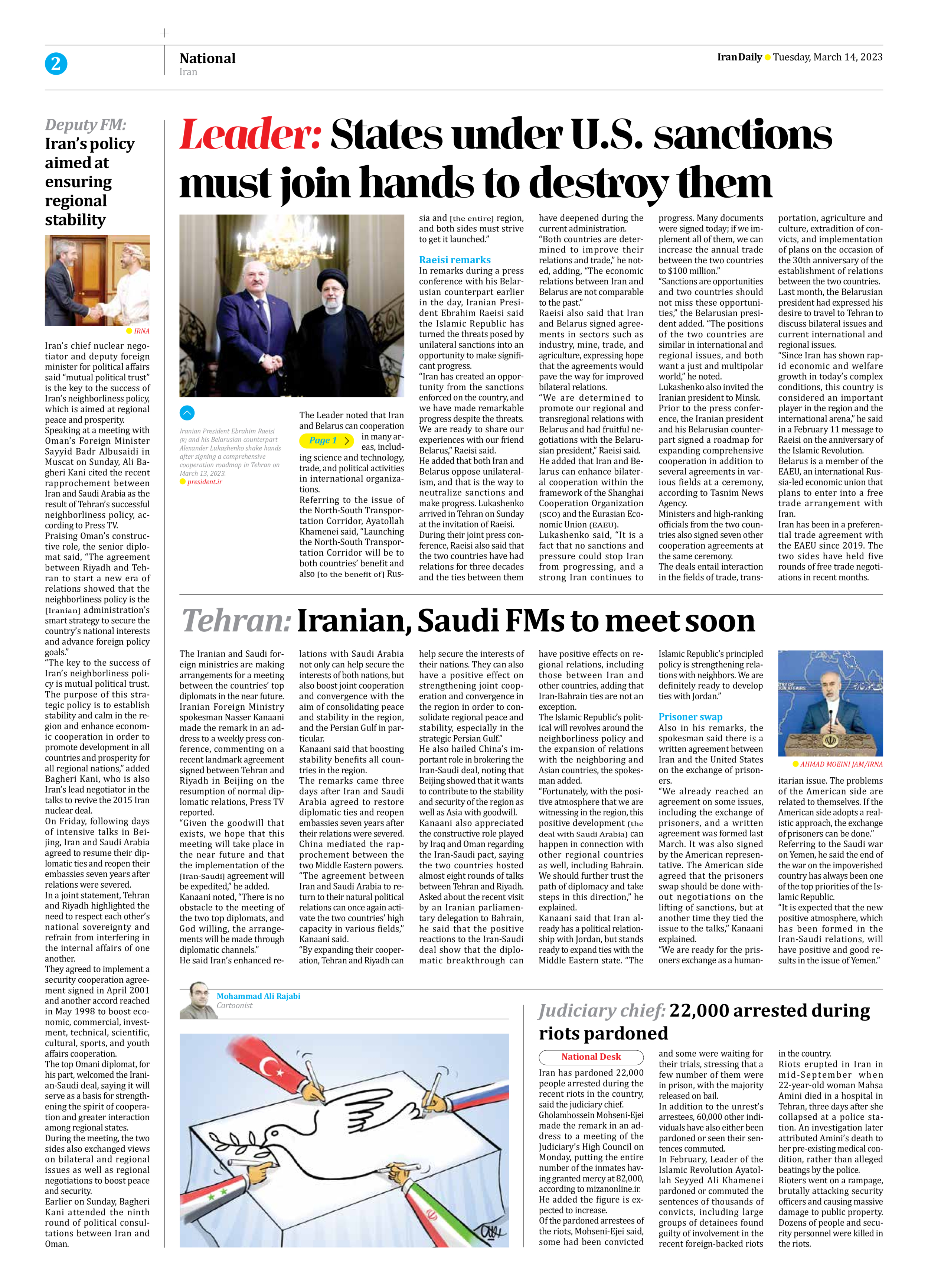
Leader: States under U.S. sanctions must join hands to destroy them
Page 1
The Leader noted that Iran and Belarus can cooperation in many areas, including science and technology, trade, and political activities in international organizations.
Referring to the issue of the North-South Transportation Corridor, Ayatollah Khamenei said, “Launching the North-South Transportation Corridor will be to both countries’ benefit and also [to the benefit of] Russia and [the entire] region, and both sides must strive to get it launched.”
Raeisi remarks
In remarks during a press conference with his Belarusian counterpart earlier in the day, Iranian President Ebrahim Raeisi said the Islamic Republic has turned the threats posed by unilateral sanctions into an opportunity to make significant progress.
“Iran has created an opportunity from the sanctions enforced on the country, and we have made remarkable progress despite the threats. We are ready to share our experiences with our friend Belarus,” Raeisi said.
He added that both Iran and Belarus oppose unilateralism, and that is the way to neutralize sanctions and make progress. Lukashenko arrived in Tehran on Sunday at the invitation of Raeisi.
During their joint press conference, Raeisi also said that the two countries have had relations for three decades and the ties between them have deepened during the current administration.
“Both countries are determined to improve their relations and trade,” he noted, adding, “The economic relations between Iran and Belarus are not comparable to the past.”
Raeisi also said that Iran and Belarus signed agreements in sectors such as industry, mine, trade, and agriculture, expressing hope that the agreements would pave the way for improved bilateral relations.
“We are determined to promote our regional and transregional relations with Belarus and had fruitful negotiations with the Belarusian president,” Raeisi said.
He added that Iran and Belarus can enhance bilateral cooperation within the framework of the Shanghai Cooperation Organization (SCO) and the Eurasian Economic Union (EAEU).
Lukashenko said, “It is a fact that no sanctions and pressure could stop Iran from progressing, and a strong Iran continues to progress. Many documents were signed today; if we implement all of them, we can increase the annual trade between the two countries to $100 million.”
“Sanctions are opportunities and two countries should not miss these opportunities,” the Belarusian president added. “The positions of the two countries are similar in international and regional issues, and both want a just and multipolar world,” he noted.
Lukashenko also invited the Iranian president to Minsk.
Prior to the press conference, the Iranian president and his Belarusian counterpart signed a roadmap for expanding comprehensive cooperation in addition to several agreements in various fields at a ceremony, according to Tasnim News Agency.
Ministers and high-ranking officials from the two countries also signed seven other cooperation agreements at the same ceremony.
The deals entail interaction in the fields of trade, transportation, agriculture and culture, extradition of convicts, and implementation of plans on the occasion of the 30th anniversary of the establishment of relations between the two countries.
Last month, the Belarusian president had expressed his desire to travel to Tehran to discuss bilateral issues and current international and regional issues.
“Since Iran has shown rapid economic and welfare growth in today’s complex conditions, this country is considered an important player in the region and the international arena,” he said in a February 11 message to Raeisi on the anniversary of the Islamic Revolution.
Belarus is a member of the EAEU, an international Russia-led economic union that plans to enter into a free trade arrangement with Iran.
Iran has been in a preferential trade agreement with the EAEU since 2019. The two sides have held five rounds of free trade negotiations in recent months.







